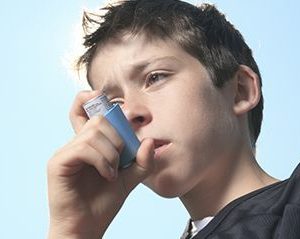- Could Your Grocery Store Meat Be Causing Recurring UTIs?
- Are You Making This Expensive Thermostat Error This Winter?
- Recognizing the Signs of Hypothyroidism
- 10 Strategies to Overcome Insomnia
- Could Artificial Sweeteners Be Aging the Brain Faster?
- Techniques for Soothing Your Nervous System
- Does the Water in Your House Smell Funny? Here’s Why
- Can a Daily Dose of Apple Cider Vinegar Actually Aid Weight Loss?
- 6 Health Beverages That Can Actually Spike Your Blood Sugar
- Treatment Options for Social Anxiety Disorder
Parent’s Mental Health Can Affect Kids’ Asthma Care

When a parent is depressed, their child’s asthma care may suffer. Now, research suggests that getting a child’s asthma under control may include assessing a parents’ mental health.
Researchers at University of Texas Southwestern found that treating a parent’s depression could sometimes improve symptom control in asthmatic children.
About 8% of American children have asthma. Symptoms include shortness of breath, coughing and wheezing due to inflammation of the lungs and airways.
“Moreover, asthma is a medical illness that is sensitive to a patient’s mood as well as medication adherence,” said Dr. E. Sherwood Brown, a professor of psychiatry.
Stress and depression in children who have asthma can cause airway constriction and worsen symptoms. Then, this poor asthma control can exacerbate a child’s depression. High rates of depression among caregivers may also put stress on kids, worsening their depressive symptoms and asthma control, the researchers noted.
To study the issue, the investigators followed caregivers with major depressive disorder and their children with persistent asthma for one year.
They found that improvement in caregiver depression was associated with fewer asthma attacks and better asthma control for children.
This improvement in asthma control occurred, in part, through reduction in the children’s depressive symptom severity.
Health care providers may need to think more broadly when treating patients, Brown said in a university news release.
“It might be useful to screen for depression both in children with asthma and their caregivers,” Brown said. “Identifying depression in the caregiver and providing effective treatment might help improve asthma control in the child.”
Lung disorder experts often see depression in their higher-risk asthma patients, said Dr. Andrew Gelfand, a UT Southwestern pulmonologist who was not involved in the study. These cases will lead to bringing in psychiatrists or increasing medications if the patient’s asthma symptoms aren’t improving.
“This study defines another opportunity to screen for and improve patient care,” said Gelfand. “It’s not just the patient’s mental health that can improve their outcomes; screening their parents for depression can also be a critical step in improving the outcomes of our poorly controlled asthmatics.”
About 4,000 Americans die from asthma each year.
The findings were published recently in the Journal of Allergy and Clinical Immunology.
More information
The U.S. Centers for Disease Control and Prevention has more on asthma.
SOURCE: UT Southwestern, news release, Oct. 28, 2022
Source: HealthDay
Copyright © 2026 HealthDay. All rights reserved.










